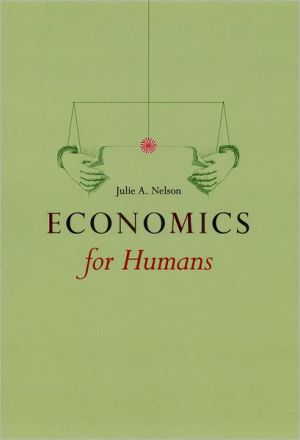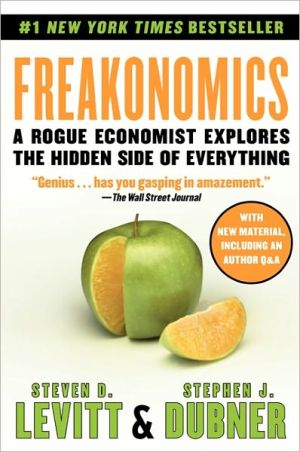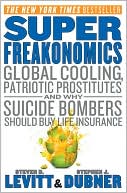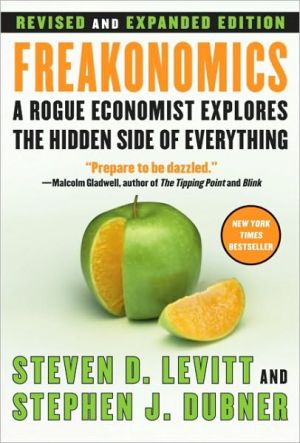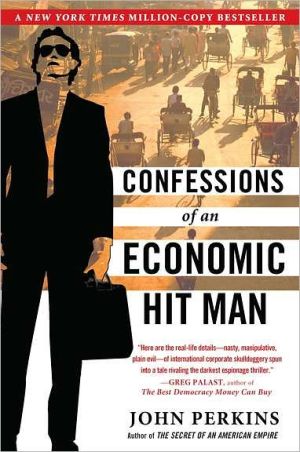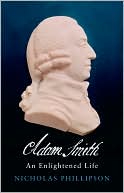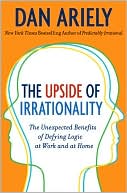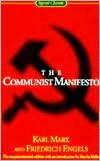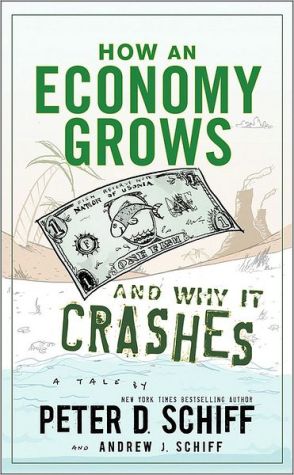Economics for Humans
At its core, an economy is about providing goods and services for human well-being. But many economists and critics preach that an economy is something far different: a cold and heartless system that operates outside of human control. In this impassioned and perceptive work, Julie A. Nelson asks a compelling question: If our economic world is something that we as humans create, aren’t ethics and human relationships—dimensions of a full and rich life—intrinsically part of the picture? Is it...
Search in google:
At its core, an economy is about providing goods and services for human well-being. But many economists and critics preach that an economy is something far different: a cold and heartless system that operates outside of human control. In this impassioned and perceptive work, Julie A. Nelson asks a compelling question: If our economic world is something that we as humans create, aren’t ethics and human relationships—dimensions of a full and rich life—intrinsically part of the picture? Is it possible to take this thing we call economics and give it a body and a soul? Economics for Humans argues against the well-ingrained notion that economics is immune to moral values and distant from human relationships. Here, Nelson locates the impediment to envisioning a more considerate economic world in an assumption that is shared by both neoliberals and the political left. Despite their seemingly insurmountable differences, Nelson notes that they both make use of the metaphor, first proposed by Adam Smith, that the economy is a machine. This pervasive idea, Nelson argues, has blinded us to the qualities that make us work and care for one another—qualities that also make businesses thrive and markets grow. We can wed our interest in money with our justifiable concerns about ethics and social well-being. And we can do so if we recognize that an economy is not a machine, but a living, beating heart that circulates blood to all parts of the body while also serving as an emblem of compassion and care. Nothing less than a manifesto, Economics for Humans will both invigorate and inspire readers to reshape the way they view theeconomy, its possibilities, and their place within it.
Economics for Humans\ \ By Julie A. Nelson \ The University of Chicago Press\ Copyright © 2006 The University of Chicago\ All right reserved.\ \ \ \ \ Introduction\ A very old definition of economics says that it is about the provisioning of goods and services to meet our material needs. That is, economics is about the way we manage our time and money so we can obtain groceries and shelter and thus "keep body and soul together." \ In many discussions of economics, however, it seems that body and soul grow ever farther apart. A particular belief about commerce and its relation to ethics is implicit in many contemporary discussions, both academic and popular. This is the belief that money, profits, markets, and corporations are parts of an "economic machine." This machine operates in an automatic fashion, following inexorable and amoral "laws." While the machine organizes provisioning for our bodies, it is itself soulless and inhuman, according to this belief. Ethical questions, on the other hand, concern the appropriate respect and care for other creatures that we-as living, social, and soulful beings-should demonstrate. Since machines are incapable of morality, thinking about economies as machines puts commerce firmly outside the ethical realm. If this belief is true, then there is no point in worrying about the ethical implications of how we work and spend within contemporary capitalist or market-oriented economies.\ Sometimes this belief takes a decidedly promarket form. "The capitalist economy can usefully be viewed asa machine whose primary product is economic growth," writes William Baumol, a distinguished economist, in a recent critically acclaimed book. Free-market and probusiness advocates can be found in business, politics, and academia. Such advocates see market economies as nonhuman "engines" that nevertheless promote human well-being by meeting our bodily desires with an ever-increasing quantity and variety of material goods and services. They say that the eighteenth-century originator of economics, Adam Smith, showed that economies are driven by self-interest, and that he also showed that the "invisible hand" of the market will make such self-interest serve the common good. A direct consideration of ethics is rather irrelevant to economics, they infer, since good outcomes arise automatically from the operations of the "machine." As Doctor Pangloss asserted in Voltaire's Candide, we are "in the best of all possible worlds."\ Sometimes this belief about the amoral economic machine comes with a decidedly antimarket or antibusiness slant. Because of the "logic" and "imperatives" of the world of money, David Korten, a popular critic of corporations writes, capitalism "has laid claim to our soul and is feeding on our flesh." Contemporary economic life is systematically driven by greed and rampant materialism, such market critics say, and so is utterly opposed to the attainment of an ethical, meaningful social life. People with a "critical," "alternative," or leftist view of society often believe that "business ethics" is an oxymoron-a contradiction in terms like "personal computer" (how personal can a computer be?) or "jumbo shrimp." They consider discussing ethical issues as they arise within the structure of capitalism to be largely a waste of time.\ Sometimes holders of this belief in the economic machine are neither decidedly pro- or antibusiness in general, but instead divide the world into two parts. A state commissioner of social services has argued, for example, that his agencies shouldn't raise the rates they pay foster parents because "You don't want a cottage industry of professional foster parents for pay." These people believe that certain realms of life must be kept in an ethically protected sphere, away from the motivations of self-interest. Activities especially rich in caring and human relationships such as child care, health care, and education are singled out for this special treatment. Other realms, they believe, can more or less safely be given over to the pecuniary interests that presumably drive normal economic life. These folks see a solution in the establishment of "separate spheres," with businesses left in charge of the commercial sphere and only nonprofits or government allowed within the protected sphere.\ These views, in some ways, seem to be worlds apart. But they share a common base. Love it or leave it, these views join in claiming, there can be no ethical mucking-around with the fundamental "drives" of a monetized, corporatized, globalized, market-reliant economy.\ I realize that not everyone will have the time (or perhaps inclination) to read this book in its entirety-so I'll cut to the chase. Here's the basic argument:\ The idea that economic systems are inanimate machines operating according to amoral laws is a belief, not a fact.\ This belief has harmful effects-for life on the planet, for human society, and for you in particular.\ Understanding that economies are vital, living, human-made, and shaped by our ethical choices can help to improve our decisions-both individually and as a society.\ But perhaps your first question is simply: "Why should I listen to you?" After all, noted economists and other social scientists everywhere teach about "economic laws"-and sound thoughtful and rigorous doing so. You may firmly believe that contemporary economics correctly describes the "mechanisms" that "drive" market economic systems. The alternative of viewing economics as vital and laden with ethical meaning might sound to you ... well, kind of squishy.\ More likely, if you are reading this page, you already believe that something going on in contemporary economics is harmful for life on the planet and human society. You probably already see that current economic systems tend to be harsh, unsustainable, and unjust in many areas. You suspect that the promarket economics you learned in college or have picked up reading or listening to the news can't possibly be the whole story. Possibly, you have listened to some of the "alternative" economics voices but find it confusing when different people each identify a different "structure" or "mechanism" as being the one that is in dire need of fixing. Or you may be turned off when such discussions seem unrelentingly pessimistic or propose only utopian-sounding solutions.\ You may work for a corporation and wonder if you should feel guilty. You may be an advocate for corporate social responsibility, but you are unsure how to defend your views. Conservatives don't think corporations need to aim for responsibility, so they put you down as a naive do-gooder. Meanwhile, radicals don't think corporations could ever be responsible, so they accuse you of selling out. Your "responsibility" position seems middle-of-the-road and wishy-washy, compared to those positions based on presumably rigorous "systemic" analysis. Or you may work in human services and wonder why your job requires you to make a personal financial sacrifice. You may be an advocate of better wages for people working in education, health care, or child care, but have a hard time countering the argument that such workers "shouldn't be in it for the money." You want well-thought-out and resilient arguments that you can use to articulate both your discomforts and your hopes, and you need ideas you can apply to practical life in the here-and-now.\ So one reason you might want to listen to what I say in this book (at least on some matters) is that I must confess to being a professional economist. I have a Ph.D. in economics. I've worked as a government economist, and I've held a tenured faculty position in a respected economics department. As part of the drill, I've also published in professional journals, including the top ones in the discipline. And I've taught economics at the undergraduate and graduate levels for over a decade. When the occasion demands, I can discuss esoteric topics with my colleagues. In other words, I've traveled to Oz-and seen behind the curtain.\ As I ventured into economics, however, I brought two other important perspectives with me. One was a spiritual and ethical sensibility and concern with poverty and deprivation. Another is the fact that I'm a woman. Economics and commerce have traditionally been male-dominated realms, while women were traditionally assigned all the tasks of personal care for children and the ill and elderly within families.\ If I were to try to live my life according to much of what I have been taught during my academic studies, I would have had to develop a personality split into three parts. My economist self would, like William Baumol, have had to admire the beauty of the economic machine. My ethical self would, like David Korten, have had to rail against the injustices generated by the economic juggernaut. My female self would, like the state commissioner, have needed to try to carve out a corner for personal concern and attention within the vast factory of impersonal economic life. The fact that I am determined not to live such a split life is what motivates me to write this book. For the sake of simplicity in writing, I will tend in this book to use the term ethics as shorthand for both concern with moral decision making and concern with interpersonal, caring relationships.\ We are all deeply involved in corporate and business life, as consumers and often as workers or managers. We all have moral responsibilities. We all need care in our lives when we are young, sick, or elderly, and many of us also give care. I believe that, by carefully examining the history of the use of certain stale metaphors and images in the social sciences, we can come to see that economic gain and ethical values aren't by nature intrinsically separate or opposed.\ (Continues...)\ \ \ \ \ Excerpted from Economics for Humans by Julie A. Nelson Copyright © 2006 by The University of Chicago. Excerpted by permission.\ All rights reserved. No part of this excerpt may be reproduced or reprinted without permission in writing from the publisher.\ Excerpts are provided by Dial-A-Book Inc. solely for the personal use of visitors to this web site. \ \
1Tending the body : the history of economics92Tending the soul : the defense of "noneconomic values"273Bringing body and soul together414Love and money? : the question of individual motivation635Business and ethics? : the question of organizational behavior876Keeping body and soul together115
